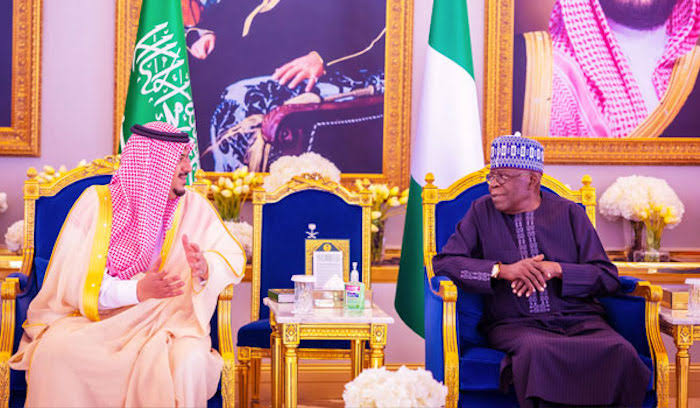
VISION 2030: A Strategic Partnership Between Two Friends with Similar Agenda, by Zekeri Idakwo Laruba
President Bola Ahmed Tinubu came with the mantra of “Renewed Hope” and since assumption of office, he has taken notable steps towards repositioning Nigeria’s economy through strategic partnerships. Despite facing unending criticism and backlash for some of his policies, he has pushed forward, seeking improved economic policies and cooperation with various countries, including those in the Middle East.
A recent meeting between President Tinubu and Saudi Crown Prince Mohammed Bin Salman has opened up new opportunities for cooperation in crucial sectors such as oil, agriculture, and infrastructure. This development is part of the administration’s broader efforts to strengthen Nigeria’s economy through international partnerships.
It is important to note that Nigeria and Saudi Arabia have historically maintained strong trade relations, with the Kingdom being one of Nigeria’s largest trading partners in the Middle East. Several agreements have been signed in the past to promote trade and investment, with no concrete results, including the Agreement on Trade Cooperation and the Memorandum of Understanding on Investment Promotion.
Interestingly, Saudi Arabia’s Vision 2030 presents lucrative opportunities for Nigeria to leverage on and strengthen its economic ties with the Kingdom. This comprehensive development program aims to diversify Saudi’s’s economy, offers a wide range of investment prospects for Nigerian economy and businesses.
Key Areas of Cooperation are:
Economic Development: Nigeria has made strategic moves to enhance its economic relations with Saudi Arabia, including a high-level visit to Riyadh last year led by the Minister of Finance and Coordinating Minister of the Economy, Mr. Wale Edun.
Export Credit Frameworks: Similarly, the Nigerian delegation held strategic discussions with the Saudi EXIM Bank,focusing on developing export credit frameworks and expanding market access between the two countries. The bank in turn has expressed a strong interest in strengthening ties with Nigerian institutions and participating in future transactions involving Saudi Government’s entities.
Infrastructure Development: The delegation explored opportunities for collaboration with the Saudi Development Fund, aiming to boost Nigeria’s infrastructure and economic developments and create more jobs opportunities for the citizens; this crucial area Nigeria lacked in recent time.
Agriculture: The Saudi Agricultural and Livestock Investment Company (SALIC) has in the past invested $1.24 billion in Olam Agri, one of Nigeria’s leading agricultural firms. Talks are reportedly underway for SALIC to acquire a larger stake in the company, particularly in projects that will enhance food security, increase agricultural output, and create jobs.
Trade: Nigeria is seeking a $5 billion bilateral trade facility with Saudi Arabia, which will enhance trade cooperation and increase economic benefits for both countries.
In the same vein, high-level meetings between Nigerian officials and Saudi Ministers responsible for Finance, Energy, and Economic Planning have strengthened bilateral cooperation across key sectors. These engagements will prioritised shared objectives, including mutual investment and sustainable economic growth, to foster a collaborative environment for future partnerships.
The partnership between Nigeria and Saudi Arabia is indeed crucial for economic growth and development, but it’s also important to acknowledge the challenges that lie ahead. One major obstacle is the ongoing conflict between Israel and Palestine. The Arab Peace Initiative, proposed by Saudi Arabia in 2002, aims to resolve this conflict by offering normalisation of relations with Israel in exchange for a full withdrawal from occupied territories.
However, this initiative has faced significant resistance, particularly from Israel. The Israeli government has expressed concerns about the return of Palestinian refugees and the potential loss of Jewish majority in the state. These concerns have led to a stalemate in negotiations, making it difficult to achieve a lasting peace in the Middle East.
So, why is peace in the Middle East crucial for a smooth partnership between Nigeria and Saudi Arabia? A stable Middle East would create a conducive environment for trade and investment, allowing both countries to focus on economic cooperation without the burden of conflict. Moreover, a peaceful resolution to the Israeli-Palestinian conflict would pave the way for increased economic cooperation between Arab states and Israel, creating new gateway for Nigeria to engage with the region.
Now, let’s talk about Nigeria’s role role in the Arabia summit. During the Arab summit held in November last year, President Tinubu delivered a keynote address, where he stressed the importance of peace in the Middle East and reaffirmed Nigeria’s commitment to supporting initiatives that foster stability and cooperation in the region.
”It is not enough to issue condemnation, we must work towards amending this aggression in Gaza which has persisted for too long…No political aim, no military strategy, and no security concern should come at the expense of so many innocent lives.” This no doubt revealed Nigeria’s willingness to play a constructive role in promoting peace and stability in the Middle East.
Finally, the political will to implement these agreements are crucial for the success of any collaboration. In this case, Nigeria has shown its willingness to strengthening economic ties with the desert kingdom, and the Saudi government has also expressed its support for Nigeria’s economic reform programs. However, the challenge lies in translating these commitments into concrete actions and policies that promote economic cooperation and development.
Saudi Arabia’s Vision 2030 has presented a unique opportunity for Nigeria to strengthen its economic relations with the Kingdom. By leveraging the investment avenues in renewable energy, tourism, and agriculture, Nigerian businesses can benefit from this ambitious development program. However, addressing the challenges of delayed implementation and regulatory frameworks will be crucial to harnessing the full potential of Vision 2030.
Zekeri Idakwo Laruba is the Assistant Editor with Economic confidential, he can be reached via: [email protected]
